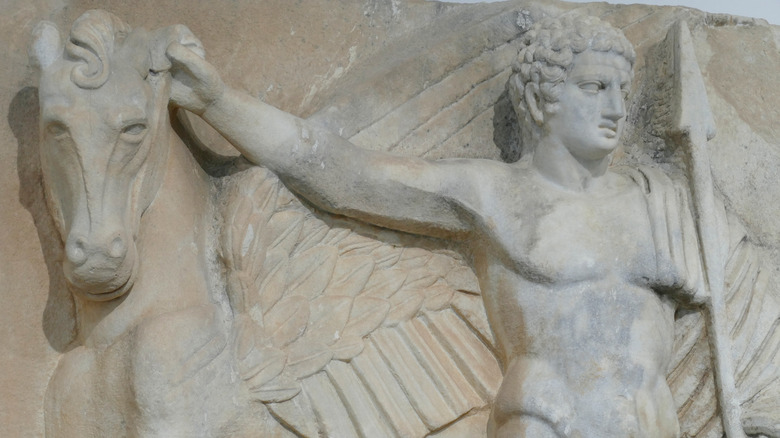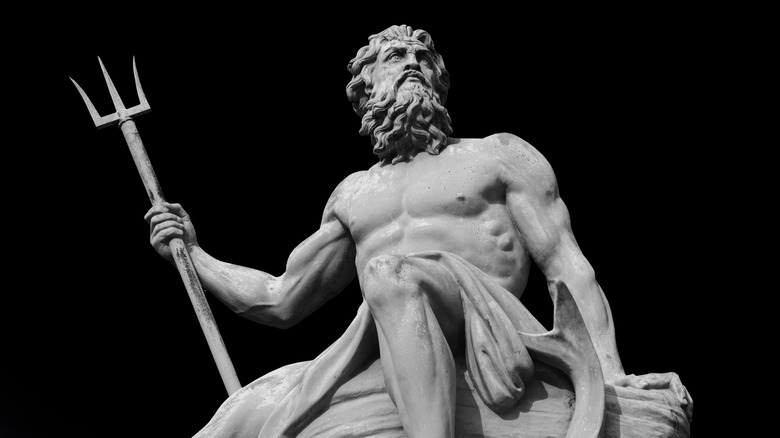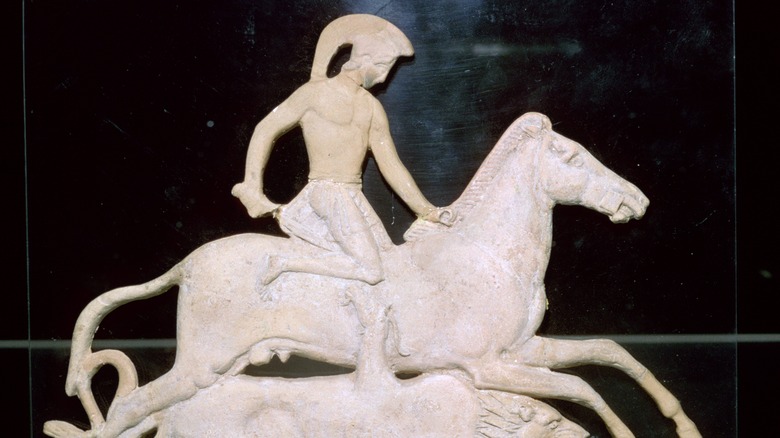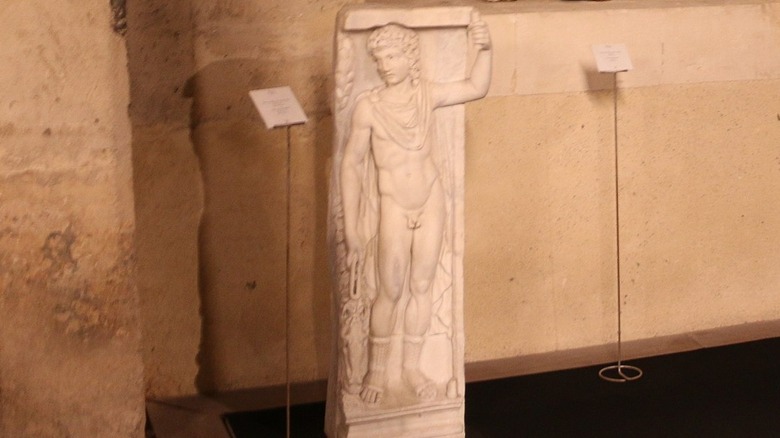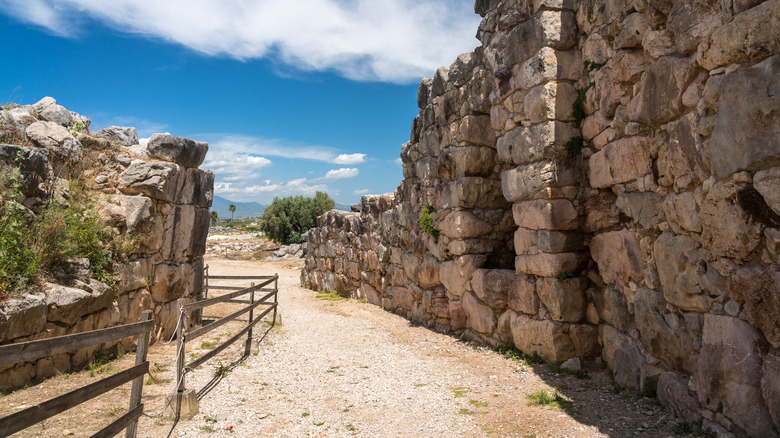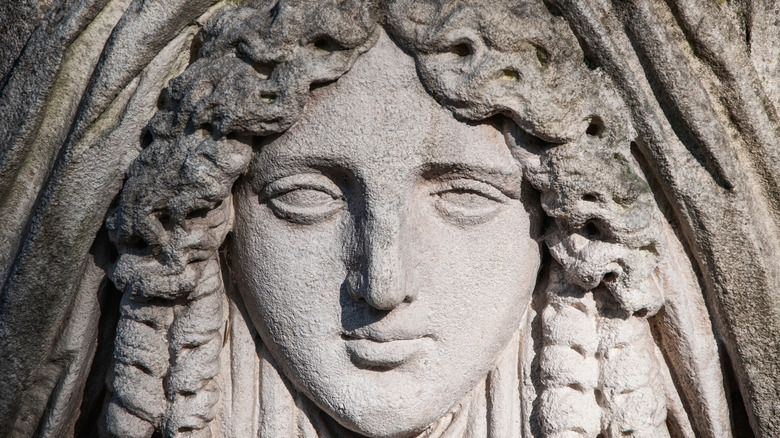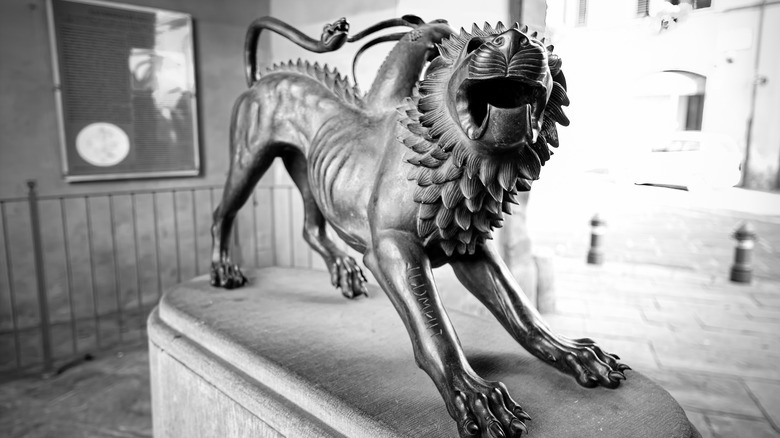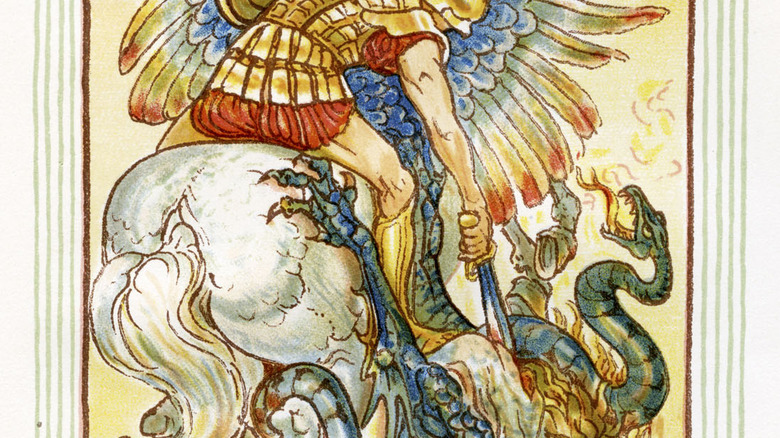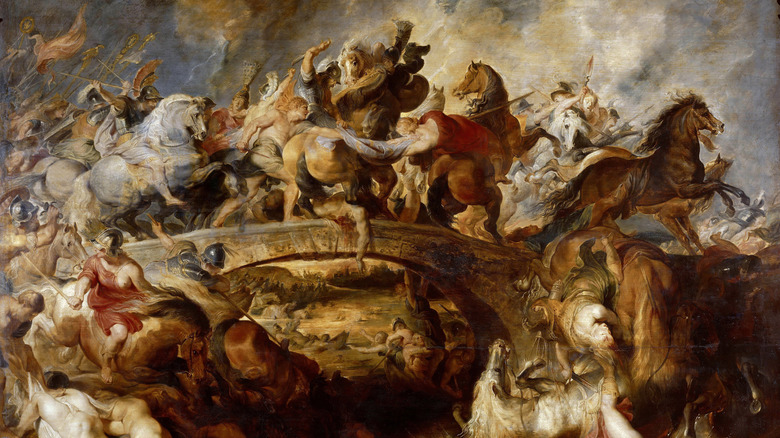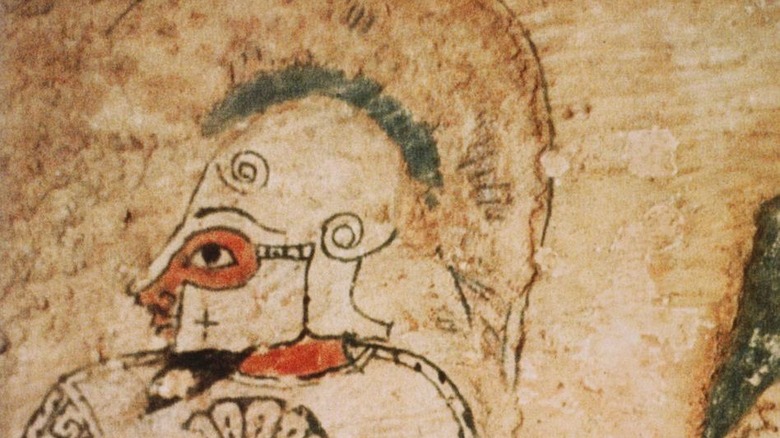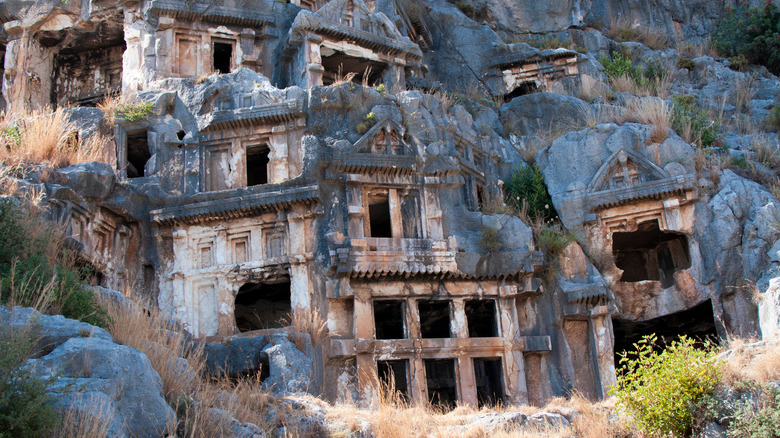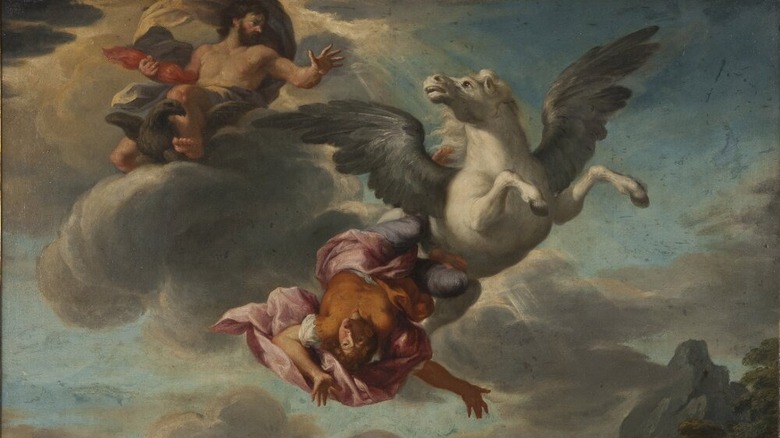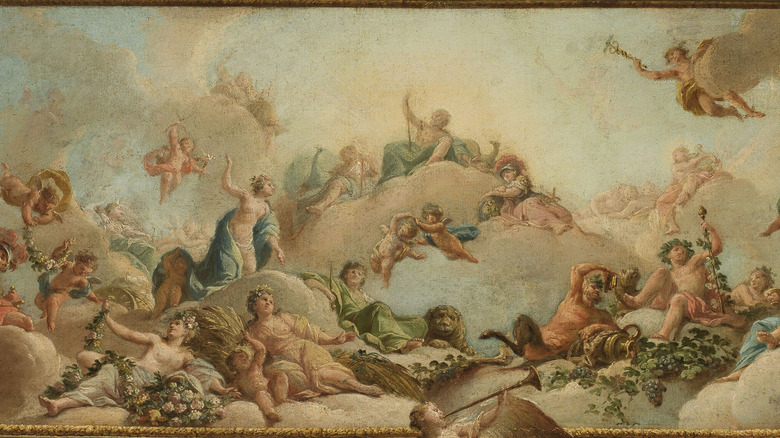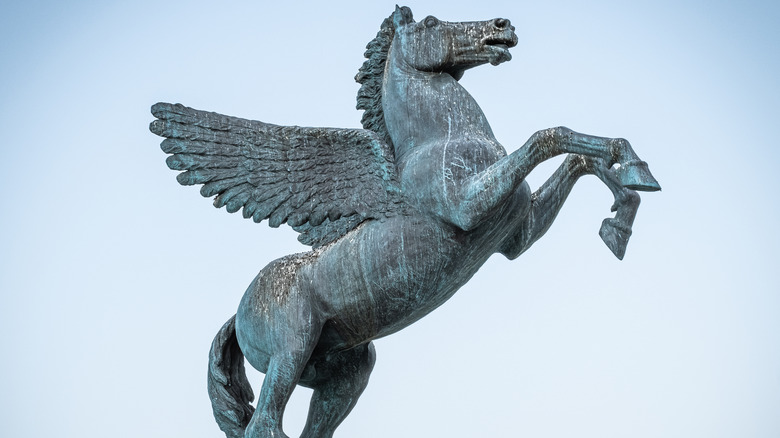The Mythology Of Bellerophon Explained
Maybe because he was one of the few epic demigods who was not fathered by the almighty Zeus, Bellerophon has not received the amount of respect and recognition that he deserves. Especially in recent times, the impressive saga of Bellerophon has been partially erased as the hero Perseus is now associated with a major part of his story. The amazing steed Pegasus has captured the imaginations of many for thousands of years, but it was only Bellerophon who managed to ride the impressive animal, not Perseus, who does so in the popular "Clash of the Titans" films.
And while demigods like Perseus and Hercules gained massive renown for slaying notorious monsters — such as Medusa, the Hydra, the Nemean lion, and so on — Bellerophon has rarely received credit for defeating another horrific beast, the Chimera. Hercules was far from perfect, but there were some lines that should never be crossed in ancient Greek society. Bellerophon made the unforgivable mistake of crossing a line and became an ever-lasting example of what not to do in the classical world. Somewhat surprisingly, that negative image may have survived up through modern times, which could explain why such an incredible story is largely unknown.
The son of Poseidon
Like many other heroes of Greek mythology, Bellerophon was linked to a natural father but also had a strong connection to the deities of Mount Olympus. Even though it was often said that he was the son of the Corinthian king, Glaucus, most believed the rumor that the god Poseidon was his real father because of the exceptional abilities he displayed even as a child (per Edith Hamilton in her book "Mythology"). When the ancient historian Homer described Bellerophon as a youth in the Iliad, he said (via World History Encyclopedia), "the gods granted him beauty and all that is lovely in manhood."
Glaucus and his father, Sisyphus, also had relationships with the gods, but in a far more negative way than Bellerophon (at least in the beginning). For betraying a secret of Zeus, Sisyphus was forced to push a boulder up a hill for eternity in Hades. Glaucus would later meet the horrific end of being devoured by his horses because he committed the terrible sin of feeding his steeds human meat.
Whether or not he was really Bellerophon's dad, Glaucus raised the kid as his own, along with his other son, Deliades. Bellerophon's mother, Eurynome, was certainly a mortal like Glaucus, though far from normal since she was a disciple of the goddess Athena. Through the guidance of her celestial mentor, Eurynome's intelligence and wisdom grew to such an extent that she reached the same level as the gods.
Bellerophon and the winged horse, Pegasus
The young demigod's link to the heavenly realm became even more clear after he encountered the impressive winged horse, Pegasus. The origin of the amazing steed was quite strange because after the hero Perseus slew the Gorgon Medusa and hacked off her head, Pegasus was born and emerged out of the severed skull.
Some accounts state that Poseidon gave Bellerophon the flying horse, but Hesiod tells the tale with Bellerophon finding the unique steed at the sacred spring of Pirene (per World History Encyclopedia). The moment he saw the beautiful creature, he became obsessed. Yet every time he tried to get close to Pegasus, the horse flew away from him. Eventually, with the help of Athena, the demigod managed to tame the beast and gained the incredible ability of flight for most of his heroic life. As Stephen Fry says in his book, "Heroes: The Greek Myths Reimagined," Bellerophon was the only one that Pegasus ever trusted to ride him.
The accidental murder of his brother
Bellerophon spent much time with his new flying companion but did not neglect his family. While on a hunting trip with his father and brother, Deliades found a moment to separate himself from the other two (per Stephen Fry's "Heroes"). Possibly out of embarrassment, Deliades sought the privacy of a bush to relieve himself without letting the other two know what he was doing.
Bellerophon was moving through the woods at the time and heard some noises from behind the bush. From the sounds, Bellerophon thought he had found a boar and hurled his spear in the direction before he startled the beast and it ran away. To his horror, he quickly realized that he had struck his brother with a wound that later killed him.
Even though it was an accident, the murder of a family member was considered one of the worst crimes by the ancient Greeks (via Edith Hamilton's "Mythology"). And according to World History Encyclopedia, Bellerophon's offenses may have been worse, for it is possible he also killed a man named Bellerus. Whether he committed two murders or just one, the prince was forced to leave Corinth.
Life in exile at the palace of King Proetus
When Bellerophon left his home, he traveled to Tiryns (pictured above) to receive purification from the king of the city, Proetus. According to Stephen Fry's "Heroes," the neighboring ruler was not just a friend of Bellerophon's family but was also known for his ability to purify souls worthy of redemption.
After Bellerophon was cleansed, he enjoyed life at the palace until the queen, Anteia, fell in love with him and tried to seduce him. One night, she came to the young man's room, which put him in a very tough position. Out of respect for Proetus, who had so kindly welcomed him to his home, Bellerophon turned Anteia down. But in an effort to make sure that her attempts were forever put to a halt, he may have been too harsh in his rejection — the queen quickly left and was furious at the young man.
Queen Anteia gets revenge for rejection
To guarantee that Bellerophon would pay dearly for rejecting her, Anteia lied to her husband Proetus and told him that Bellerophon had tried to assault her (via World History Encyclopedia). Proetus was outraged but could not punish Bellerophon himself because it would have been a grievous act to do so against a man who was still his guest (per Edith Hamilton's "Mythology"). Therefore, Proetus devised a way to get rid of him without being directly involved.
Without giving a hint of his true intentions, Proetus sent Bellerophon away to his father-in-law, King Iobates of Lycia. He claimed it was a short trip to send a message as a favor, so the grateful guest accepted the request without hesitation. But in truth, Proetus planned to have Iobates punish the man for trying to violate his daughter. Bellerophon then traveled to Lycia with no idea what was in store for him.
King Iobates gives Bellerophon an impossible mission
For Proetus' plan to work, Bellerophon was instructed to give the sealed letter to Iobates, who would read it and immediately become aware of the crime committed against his daughter. According to Robert Graves in his book, "The Greek Myths," the note only said (via World History Encyclopedia), "Pray remove the bearer from this world; he has tried to violate my wife, your daughter."
Bellerophon did as he was told, but for several days and nights, Iobates entertained the newcomer as a respected guest without reading the letter (via Stephen Fry's "Heroes"). By the time he finally got to it, Iobates also decided it was too late to get rid of his guest himself and came up with a new plan that he was sure would lead to the young man's early demise. The king gave Bellerophon the mission to slay a ferocious monster known as the Chimera.
The Chimera had been terrorizing the nearby countryside of Methian near the border of Caria and Pamphylia. As it freely moved about the land, the beast left a trail of burned buildings and corpses, both livestock and villagers. Sending Bellerophon off to deal with the fearsome creature was a win/win scenario for Iobates because even if the young man somehow managed to kill the Chimera, it would no longer be ravaging his lands. Regardless of the overwhelming danger, the brave hero accepted the challenge to face the monster.
Quest to slay the Chimera
The Chimera came from an ancient demonic lineage as the offspring of Typhon and Echidna (via World History Encyclopedia). Typhon had not only 100 fire-breathing heads but also the utterly creepy ability to make the sounds of all animals. Echidna was equally horrifying as a half-snake, half-woman hybrid creature that birthed Cerberus, the three-headed hound that guarded the entrance to Hades.
Although horrifying, the Chimera must have been a sight to behold for Bellerophon when he first set eyes on it. The unique beast had several heads and characteristics of different animals fused into one. In his ancient poem, "Theogony," Hesiod describes the unique monster and says (via World History Encyclopedia), "[The] Chimaera, who breathed invincible fire, terrible and great and swift-footed and mighty. She had three heads: one was a fierce-eyed lion's, one a she-goat's, one a snake's, a mighty dragon's."
To kill the beast, Bellerophon flew on Pegasus high above it, out of reach of the flames the Chimera spewed forth. He then rained down arrows upon it, strategically wounding the monster down its back (per Stephen Fry's "Heroes"). Weakened and desperate, the monster made another attempt to roast the attacking duo, and Bellerophon used the opportunity to make his fatal strike. With the creature's jaw wide open, the hero hurled a special spear of lead deep into the huge orifice. Once in the Chimera's throat, the lead melted from the intense heat of the fire, and the molten metal brutally killed the creature as it burned through its insides.
Fighting the Solymi and the Amazons
Iobates must have been pleased to no longer have the Chimera terrorizing the land, but he still wanted Bellerophon to die. So, when the hero triumphantly returned to the palace, celebrations were cut short as the king sent the hero to battle with the Solymi of Pisidia. These barbaric warriors were a threat to Iobates; therefore, it was another opportunity to kill two birds with one stone by creating circumstances where his enemies could kill each other.
Bellerophon, once again, obeyed the king's wishes and set off on Pegasus to confront the Solymi. Once he hovered above their city, the hero did not rain down arrows but instead used large boulders to dispatch his foes. According to Stephen Fry's "Heroes," the Solymi eventually surrendered after 70 of their best men were slain from the onslaught.
After defeating them, Bellerophon was then ordered to fight the legendary warrior women known as the Amazons, who he conquered using the same strategy. Still, Iobates would not give up and sent the hero on his fourth mission to remove the threat of a large band of Carian pirates. As with all the other tasks set before him, Bellerophon succeeded.
Bellerophon wins the approval of King Iobates
In one final attempt to dispose of Bellerophon, Iobates took a more direct approach and set a trap to kill him. The king gathered up a group of his best warriors to ambush the hero, but Bellerophon defeated them all. The demigod may have even received tremendous assistance from his father, Poseidon, who flooded the Xanthian Plain and wiped out all the Lycian soldiers that assaulted his son.
At this point, it was crystal clear to the king that Bellerophon was favored by the gods, so Iobates revealed that he was only acting on behalf of his son-in-law and gave the hero the letter as proof. The king then allowed Bellerophon and his daughter, Philonoe, to marry. According to Philip Freeman's "Oh My Gods: A Modern Retelling of Greek and Roman Myths," the couple was given enough land to encompass half of the kingdom.
The dark side of Bellerophon
Bellerophon and Philonoe were happily married in Lycia for many years and raised three children — Isandros, Hippolochos, and Laodameia (via World History Encyclopedia). When news reached Anteia that the hero was not only to become the heir to the Lycian Kingdom but was also wed to her sister, the queen knew everyone would discover the truth of her deception. In shame, she then took her own life, or so the story goes (per Stephen Fry's "Heroes").
In a more damning account of Bellerophon in Philip Freeman's "Oh My Gods," the hero may have returned to Tiryns and tricked both Proetus and Anteia into thinking he wanted to make amends. There was no way the queen could then turn down an offer to soar through the sky upon Pegasus, but while she was up high above the ground, Bellerophon took the opportunity to knock her off the steed and send her tumbling down to her death.
The once-great hero's downward spiral continued as his immense hubris led him to think he was worthy of becoming a god. Whether he received celestial approval or not, Bellerophon decided he would take his fate into his own hands and act.
Zeus punishes the prideful hero
To become a deity, Bellerophon figured that he needed to reach the home of the gods, Mount Olympus. And unlike most, he had a way to reach them up in the clouds, which was one of the major reasons he felt he deserved to be among them (not to mention the fact that he was the son of Poseidon, one of the greatest deities). So, he rode Pegasus toward the heavens (via Stephen Fry's "Heroes").
But Zeus was aware of the fallen hero's intentions and determined that such a blasphemous act by a mere mortal could not go unpunished, even if he was a demigod. Philip Freeman says in "Oh My Gods" that the Lord of Mount Olympus sent a gadfly to harass Pegasus with painful stings, which then caused Bellerophon to fall off his steed. Many sources state that the disgraced warrior was fortunate to survive the great fall, but the traumatic event left his body broken.
The downfall of Bellerophon
The most optimistic telling of the Bellerophon saga ends with him landing relatively unscathed in Cilicia (a region to the south of modern-day Turkey) and establishing the city of Tarsus. A grimmer possibility was that he fell to his death. However, the much more common account has an even more depressing conclusion. Stephen Fry says in "Heroes" that Bellerophon crashed into rocks upon his fall and devastated his hip, leaving him crippled.
Society shunned Bellerophon for challenging the gods, and he was forced to live the rest of his life as an outcast (via Philip Freeman's "Oh My Gods"). Abandoned by all, not even his loved ones interacted with him until his bitter end. From then on, Bellerophon was then forever used as an example of one's fate for showing the deities such disrespect. The cautionary tale must have worked, for there was no one else willing to commit such a grievous act of sacrilege after Bellerophon.
Pegasus reaches Mount Olympus
After the tragic fall of Bellerophon, Pegasus had a very different fate. The magnificent horse continued flying towards Mount Olympus, and once he reached it, he was allowed to make the celestial stalls his new home (per Edith Hamilton's "Mythology"). Over time, Pegasus became one of, if not the most, favored of Zeus' steeds. As a sign of his elevation, Pegasus' new role became the one to bring the thunder and lightning to the king of the gods whenever he wanted.
The winged horse was also looked after by Eos, the god responsible for bringing dawn to the sky every day. In the heavens, Pegasus was immortalized as a constellation, according to Britannica. To this day, the mythical horse remains one of the largest constellations and is located in the northern sky. Constellation Pegasus contains the first sun-like star known to have a planet in orbit around it — 51 Pegasi and 51 Pegasi b, respectively.
